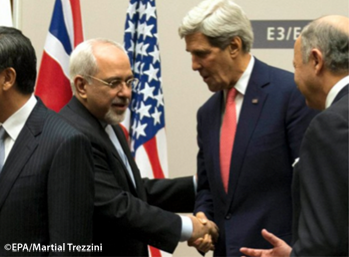Blog
Our World Just Shifted

The potential agreement with Iran on nuclear power is huge. It provides the positive complement to the negative impact of 9/11.
It adds new hope for the resolution of the greatest issues we face at every level. Obama and Kerry represent a new face of leadership integrity. They pay equal attention to the subtleties of context through enlightened diplomacy and to confronting the realities of the past. However, they are willing to seek a new truth by reinterpreting those realties in the light of future possibilities.
In negotiations, because of Iran’s past duplicity, they have insisted on their modification of Ronald Reagans’ principle of ‘trust but verify’, which became ‘distrust but verify’. They and their international counterparts have thoroughly, intensely, to the point of tedium, reviewed all positive and negative options. They have fully expressed their own values while honoring those of Iran. They have kept these options open despite the slipping deadlines to avoid premature closure in terms of making a flawed deal or abandoning negotiations altogether.
The proof of the pudding will be in the detail of the final agreements. It seems, though, that the conditions have been set both for a path to implementation and the appraisal and monitoring necessary for deciding whether the whole project is succeeding or not.
No matter how the process proceeds a significant step forward has been made in our collective consciousness. We used to believe that the primary power for getting things done was control. Unless you had the resources and willpower to overcome all opposition you would be unlikely to succeed. The complexity of the post-WWII world soon led us to understand that maintaining such a degree of control over large and complex issues, organizations and institutions was impossible. The prescient Mary Parker Follett, writing in the late 20s, was one of the earliest to realize that organization and management were all about power. She asked us to develop our power with rather than our power over others.
I have argued in my own work that we have succeeded in this. I have referred to power over as control and power with as influence. The open-systems age, free market and democratic philosophies have now taken us to the point where we overuse influence for control. We have learned how to use influence for the benefit of the partners in negotiations without due awareness or attention to the impact on all people affected by those negotiations.
So influence for control has become the major power issue of our times and is the major contributor to our expectation that authorities are lying to us, that our institutions are to varying degrees corrupt and that we are destroying our families, our communities and our planets through the evermore sophisticated use of influence for control.
I argue for the addition of a new level of power to be added to control and influence: appreciation. It is the power within, the natural unconscious power of purpose within all of us that connects us to our ultimate origins and ultimate ends. Our power of appreciation intuits and senses what is good for ourselves and our world. When brought to awareness, it provides the complementary counterpoint to our powers of control. Our influence then is no longer used for more control but to mediate equally between the use of appreciative means that connect with the common good and for control means that get things done.
The Iranian negotiations show us how to use all three equally. They awakened me out of my two-year blog blockage to promise more blogs that will address how we are all doing in making progress in this direction.
Follett, M. P. (1927).Dynamic administration. (Reprint 1942). New York: Harper & Brothers Publishers.
Obama's Power

Obama, as the new President of the United States, is the perfect exemplar of a transformational leader who has the capability to influence the transformation of organizations—particularly those of government. It is also evident from the tremendous global response to his candidacy that he can influence transformation of our entire world.
As I experience his rise to power I'm struck by the uncanny parallels of what he espouses and what I have learned about emerging new concepts of organization. Obama makes it clear that he has a different view of the world. His view of the world is very aligned with the AIC (appreciation, influence and control) approach covered in the book The Creative Power. He insists that the new vision of leadership be not bound by past realities (control) but be open to new possibilities (appreciation).
He emphasizes that "the world has lost trust in our purposes and our principles." He insists that we must turn outwards from a focus on our own problems to participate in creating the conditions in world affairs that will help us and other countries solve the bigger problems that affect us all. "Our security and well-being depend on those who live beyond our borders."
"The Mission of the United States is to provide global leadership grounded in the understanding that the world shares a common security and a common humanity."
In advocating a new leadership he sees the relationship between purpose and power.
“To see American power in terminal decline is to ignore America's great promise and historic purpose in the world. If elected president, I will start renewing that promise and purpose the day I take office.
The two principles he uses to guide the new leadership are the same as those advocated by the book The Creative Power."
"To renew American leadership in the world, I intend to rebuild the alliances, partnerships, and institutions necessary to confront common threats and enhance common security. Needed reform of these alliances and institutions will not come by bullying other countries to ratify changes we hatch in isolation. It will come when we convince other governments and peoples that they, too, have a stake in effective partnerships."
In other words, he adds the level of Influence to the traditional control model (adds I to C).
Secondly, the key difference is that he sees the need for what the Creative Power calls appreciative power—the power of the whole.
"Finally, to renew American leadership in the world, I will strengthen our common security by investing in our common humanity...To those people in the huts and villages of half the globe struggling to break the bonds of mass misery, we pledge our best efforts to help them help themselves, for whatever period is required—not because the communists may be doing it, not because we seek their votes, but because it is right. If a free society cannot help the many who are poor, it cannot save the few who are rich. I will show the world that America remains true to its founding values. We lead not only for ourselves but also for the common good."
What AIC offers is the organizing philosophy, model and experience necessary to implement Obama's leadership vision. It demonstrates how it is possible for us as individuals, organizations, and social institutions to achieve much higher levels of purpose than we currently do—at much lower cost and in much less time, while at the same time making our engagement with the organizing process a much more constructive and fulfilling one.
Global experience with AIC demonstrates that we try to resolve too much through control. An equal emphasis on appreciation dissolves many of the problems of control, and influence provides the means for this resolution. Control without supportive appreciation and influence produces stovepiped organizations that find it difficult to share information or resources. They are not capable of fully appreciating and evaluating the situation and alternative course(s) of action. They are unable to use all of the power that is available to them. We are at a phase in our evolution of social organization in which we have transcended the limits of a pure control view of power (power over) and have learned to use influence (power with), but we continue to use its evolved power of influence for control. What we need to learn and to build into our organizing processes is an equal application of influence for appreciative ends (power to). Current approaches do not make full use of the potential power of purpose. The addition of influence and appreciation to control, literally, make the pursuit of purpose exponentially more "power-full".
A key drive of the new approach is the development a much more comprehensive and practical understanding of the power and its relationship to the achievement of purpose. Traditional concepts of organization have emphasized "power over" (control power) In the last several decades we have learned that command and control methods are very limited in their ability to cope with our dynamic, rapidly changing world. We have discovered necessity of working with others outside our area of control. We have developed an understanding of "power with" (influence power). However we have been using our new understanding to develop more "power over" through "power with". We use influence to obtain more control.
The AIC process centers itself in influence and uses influence equally for appreciation "power to" and for control "power over". "Power to" or appreciative power is the essential difference that Obama's new leadership provides. Appreciative power provides the power to create purpose, which in urn creates all three kinds of power. The AIC process automatically uses all three powers as an integral part of its organizing process and thus becomes both more "purpose-full" ad more "power-full".
Though the AIC process can be used for any purpose, its most powerful application is to adders directly the major issues affecting implementation of the new vision.
- Developing the mindset that the new leadership is about developing "power to" rather than "power over" or "power with" in order to get "power over".
- The Obama leadership will provide conditions that will enable all people to be better able to contribute to their development, that of other and that of their world for our most intractable problems that affect many people. Our experience suggests that this cannot be done by explanation but by example.
- Experience with global development suggest that experience has to be at a scale large enough to have global impact but small enough to have individual meaning and local context. It suggests that the development unit is a region in the low millions
A very powerful application of the concepts, that would have most leverage for implementation of the new vision would be to involve all regions of the country in organizing process to determine local priorities within the framework of the new vision. Rather than producing a plan such organizing process produce a self-organizing process that involves everyone affected and replicates itself at lower and higher levels that automatically produce action. Two such large scale efforts are described in the book. The organization of the energy sector in Colombia and an organization process that spread over the whole of Thailand.
Compared with expert driven consulting approaches to organizational change the AIC approach is much more cost affective and is able to achieve results much faster while at the same time obtaining fuller levels of engagement and much more commitment to the results.
Transforming
Ourselves,
Our Organizations,
and Our World more..


